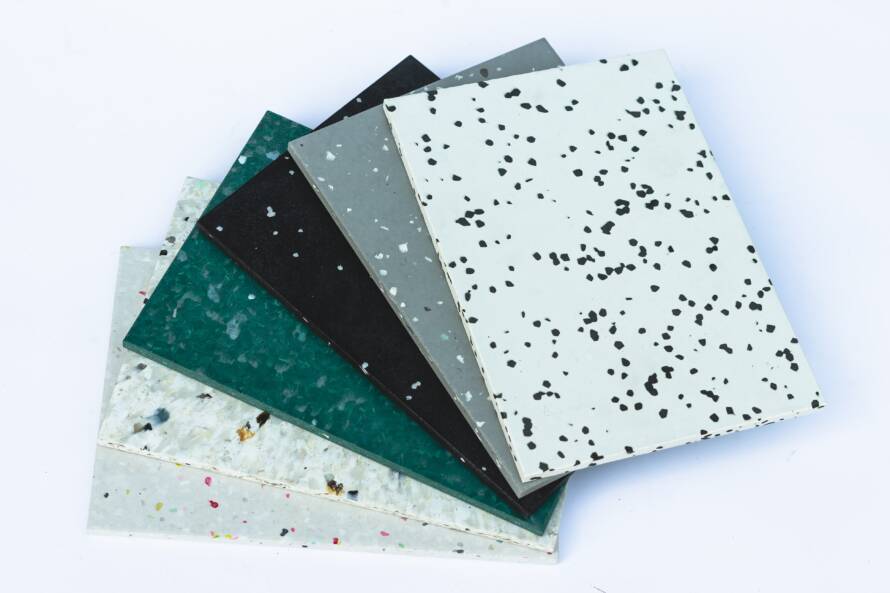
THE GOOD PLASTICS- C2C Certified Material Health Certificate™ Silver v4.0
Certified products:
- Plastic panels
Client: The Good Plastic
Context: As the consequences of climate change become more and more present, architects, builders, and the industry, in general, are increasingly aware of the importance of including sustainability criteria in the spaces we inhabit and occupy. The choice of materials is a fundamental aspect in determining the impact of a building on the well-being of people, society, and the planet. And the companies that produce these materials are increasingly aware of this.
The Good Plastic Company is an international manufacturer of plastic panels, Polygood™. These panels are made from 100% recycled and recyclable polystyrene and can be used to create interior and exterior design elements, such as wall and ceiling cladding or some furniture such as tabletops, shelves, reception counters, kitchen furniture, etc.
As their mission statement states ‘We show companies that they can make beautiful and functional new products from locally produced waste and make a visible commitment to the circular economy’ and in order to have a certificate to support the sustainability of their product, they opted for Cradle to Cradle certification and approached Eco Intelligent Growth (EIG) as accredited assessors of the program.
Certified Product Description
Plastic panels (TM Polygood) are made from 100% recycled plastic. Products dedicated to surface construction materials can be used to create interior and exterior design elements. Applications are wall & ceiling claddings, floor coverings, and furniture construction material (table tops, shelves, reception desks, retail presentation desks, and kitchen furniture), etc.
The product is designed to be scratch-resistant. The material is produced from a wide range of post-consumer and post-industrial plastic waste.
Main challenges:
-
Optimising the use of renewable energy in production facilities
The company faced the challenge of increasing the percentage of renewable energy used in the manufacture of its products. Although they already managed to use 17% renewable energy in their facilities, a strategy was developed to increase this percentage, especially in the plant located in Ukraine, where only 4.4% of the electricity was from renewable sources.
-
Supply Chain Human Rights Risk Assessment and Mitigation
The company had to conduct a comprehensive assessment of human rights risks throughout its supply chain, beyond Tier 1 suppliers. This involved working with suppliers in different regions to identify areas of risk and develop strategies to ensure that standards of social equity and fairness are maintained, a key aspect of C2C Certified® certification.
Scope of the project
Accompanying product certification, contact with the entire supply chain for data collection and analysis, and development of documentation.
Step by step
In order to demonstrate the alignment of the product with the circular economy and C2C, The Good Plastic Company underwent a rigorous audit and analysed the product, its origin and traceability, its production stages, supply chain and environmental policies comprehensively, taking into account the 5 assessment aspects of the Cradle to Cradle Certified® product programme:
- Material health: In order to gain in-depth knowledge of the origin and traceability of the raw materials used in Polygood™ and to ensure that the materials are healthy for people and the environment, the company implemented a Know Your Business process with each supplier, thus verifying their accreditations and certifications to validate the origin, quality and non-toxicity of the recycled plastic they process. The product was 100% characterised by generic material and 75% was assessed. With the aim of further improvement, a strategy was developed to eliminate or optimise all chemicals assessed as X or grey rated in this category.
- Product circularity: The Good Plastic Company designed its Take Back programme, an initiative that ensures that panels and the materials from which they are made are optimally and responsibly reused at the end of their useful life, identifying strategic partners to do so. Through the reuse of existing materials, the demand for new raw materials can be reduced and waste products can be prevented from ending up in landfills. The Good Plastic Company follows with this programme one of the maxims of the circular economy: avoiding the concept of waste.
Renewable energy and carbon management: electricity consumption and greenhouse gas emissions associated with the product manufacturing phase were quantified, certifying the facilities’ compliance with international emissions regulations. 100% of the electricity used to manufacture the product is of renewable origin at the facility located in the Netherlands, and 4.4% at the facility located in Ukraine. Thus, 17% of the total electricity consumption is from renewable sources. With the aim of increasing this percentage in the future, a strategy was developed to increase the use and/or purchase of renewable electricity and to address greenhouse gas emissions.
- Water and soil management: following the analysis, it was concluded that the facility complies with water quality guidelines. In addition, The Good Plastic Company, designed a strategy with the objective of achieving water and soil conservation requirements at the Silver level at the time of recertification.
- Social equity: Human rights risks were assessed for the company and its suppliers up to the final stage of manufacturing (Tier 1), advancing the risk assessment beyond Tier 1. The company demonstrated its commitment and support to establish, promote, maintain and enhance a culture of social justice. It has a human rights policy based on international standards and knowledge of the company’s risk areas and a strategy to implement the policy.
Achievements
-
100%
Cradle to Cradle Certified® version 4.0 Certification: First material of its kind to achieve this prestigious certification, demonstrating a commitment to sustainability and circular design.
-
100%
Development of sustainability documentation: Created comprehensive reports on energy savings, water usage, and social aspects, providing information that the company was unaware of prior to the certification process.
-
100%
Creation of the Take Back program: Initiative that promotes the circular economy through material recovery and reuse, effectively eliminating waste.